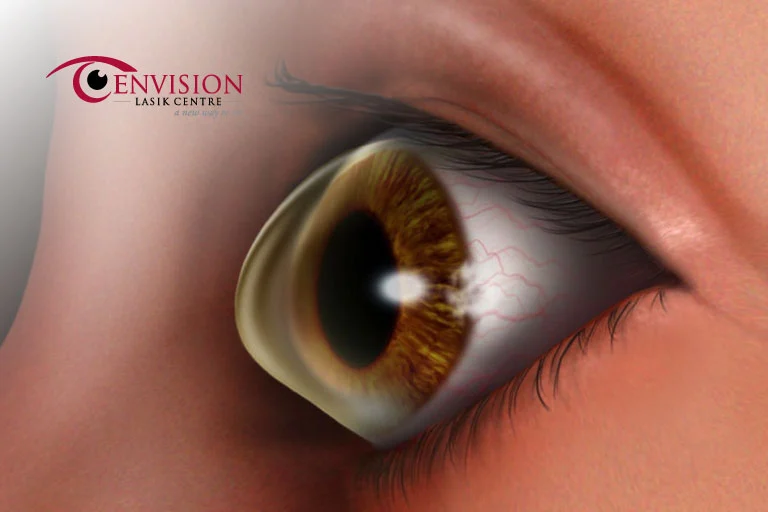Struggling with blurry vision or light sensitivity? These could be early signs of keratoconus. Get expert, compassionate care at Envision Lasik Centre, Hyderabad’s leading keratoconus hospital.
Keratoconus: Is It a Serious Eye Disease? A Complete Guide

AUTHOR
Ophthalmologist/ Eye Surgeon 13+ Years Exp
MBBS, MS – Ophthalmology
TSMC- TSMC/FMR/05251 (2018)
CONDITION
CALL US 24/7 FOR ANY HELP
GET IN TOUCH ON
If you’ve recently come across the term “keratoconus” or suspect that you or someone you love might have it, you’re probably wondering just how serious it is. Is it something to worry about? Can it impact your life significantly?
At Envision Lasik Centre, we believe in educating you about your eye health so you can make informed decisions. This guide will take you through everything you need to know about keratoconus—from what it is, to how it progresses, and what you can do about it.
Spoiler alert? While keratoconus is a progressive condition that can affect your vision, it’s manageable with the right care and early intervention.
What Is Keratoconus?
First, let’s start with the basics. Keratoconus is a condition where your cornea (the clear, dome-shaped surface of your eye) begins to thin and protrude outward, forming a cone shape. You can think of the cornea as the “camera lens” of the eye. When it’s in its normal round shape, light focuses into your eye properly, giving you clear vision.
But when the cornea develops a cone shape, it causes distorted and blurry vision. Imagine looking at the world through a warped filter—that’s what keratoconus can feel like.
How Serious Is Keratoconus?
Keratoconus ranges from mild to severe, depending on its progression and how much it affects your vision. The good news is that keratoconus itself won’t lead to total blindness. However, if left untreated, it can significantly weaken your eyesight, making everyday tasks like driving, reading, or watching TV extremely difficult.
The seriousness often depends on the stage of the condition. While mild keratoconus can be corrected with glasses or soft contact lenses, advanced stages might require treatments like specialty lenses, procedures like corneal cross-linking, or, in rare cases, a corneal transplant.
What Does It Feel Like to Have Keratoconus?
Keratoconus doesn’t hit you all at once. Instead, it progresses gradually. Some early signs and symptoms you might experience include:
- Blurry vision: Straight lines may appear wavy or blurry, and glasses don’t seem to provide perfect correction anymore.
- Light sensitivity: Bright lights start to feel overwhelming, especially at night.
- Halos and glare: You may notice halos or glare around headlights and streetlights.
- Difficulty driving at night: Objects might appear distorted or shadowy under low light.
- Frequent prescription changes: If your optometrist keeps updating your glasses prescription, it could indicate a progressing keratoconus.
What Causes Keratoconus?
The exact causes aren’t fully understood, but several factors can increase your risk. These include:
- Genetics: If keratoconus runs in your family, you’re more likely to develop it.
- Eye rubbing: Rubbing your eyes aggressively can weaken the cornea over time.
- Underlying conditions: Certain disorders, like Down syndrome or connective tissue diseases, are linked to a higher likelihood of keratoconus.
- Environmental factors: Prolonged UV exposure and poorly managed allergies may also play a role.
How Does Keratoconus Progress?
Keratoconus typically starts during the teenage years or early adulthood and progresses slowly over several years. Here’s how it can develop over time:
- Early stage: Mild distortions in vision, often manageable with glasses or soft contact lenses.
- Intermediate stage: Vision becomes more irregular, and specialty lenses (like rigid gas permeable or scleral lenses) are required.
- Advanced stage: The cornea becomes scarred or extremely thin, making surgical intervention necessary in some cases.
With early detection, however, you can often slow or stop the progression of keratoconus, keeping your vision stable for years to come.
Keratoconus Treatment Options
At Envision Lasik Centre, we offer a range of effective treatments to help you manage keratoconus, no matter the stage of the condition. Here are the most common treatments available:
1. Eyeglasses and Contact Lenses
For early stages, standard glasses or soft contact lenses may correct your vision. Once vision becomes harder to correct, specialty lenses such as scleral lenses or rigid gas permeable (RGP) lenses can provide clear sight by creating a smooth refractive surface over your cornea.
2. Corneal Collagen Cross-Linking (CXL)
This advanced, minimally invasive treatment works to strengthen the collagen fibers in your cornea, halting progression. By applying vitamin B2 drops and activating them with UV light, CXL can stop keratoconus from worsening, often preserving vision in the long term.
3. Intacs
Intacs are small, ring-like implants inserted into your cornea to flatten its shape and improve vision. This outpatient procedure is an excellent option for intermediate-stage keratoconus.
4. Corneal Transplant (Keratoplasty)
For severe cases where the cornea becomes too misshapen or scarred, a corneal transplant may be recommended. Though it sounds daunting, corneal transplants are highly successful in restoring functional vision.
Can Keratoconus Be Prevented?
While keratoconus cannot always be prevented, there are steps you can take to lower your risk or slow its progression. Here are some actionable tips to keep your corneas healthy for years to come:
- Avoid rubbing your eyes. If you have allergies, talk to your doctor about managing them safely.
- Protect your eyes. Wear sunglasses to shield your eyes from harmful UV rays.
- Get regular eye exams. Early detection can make a huge difference in managing this condition effectively.
- Manage underlying conditions. If you have a condition linked to keratoconus, work closely with your healthcare provider to manage it.
At Envision Lasik Centre, we strongly emphasize preventive care to help you maintain optimal eye health.
Why Choose Envision Lasik Centre for Keratoconus Care?
At Envision Lasik Centre, we treat more than just your eyes—we care about your peace of mind. Our expert team specializes in diagnosing and treating keratoconus with state-of-the-art technology and cutting-edge treatments like corneal cross-linking. We’ll work closely with you to craft a personalized treatment plan that prioritizes your quality of life.
With a track record of excellence and compassion, Envision Lasik Centre is your trusted partner in managing keratoconus and protecting your vision.
Take the First Step Toward Better Vision Today
If you’ve noticed changes in your vision or suspect keratoconus, don’t ignore it. Early diagnosis and treatment are critical to preserving your eyesight. Schedule a consultation with Envision Lasik Centre today to get expert advice and a clear treatment plan tailored to your needs.
Your vision is precious. Take charge of your eye health and contact us today—we’re here to help every step of the way!
AUTHOR
Ophthalmologist/ Eye Surgeon 13+ Years Exp
MBBS, MS – Ophthalmology
TSMC- TSMC/FMR/05251 (2018)
CONDITION
CALL US 24/7 FOR ANY HELP
GET IN TOUCH ON



